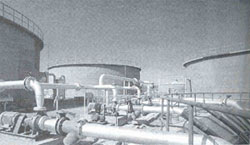Powered by waste
Powered by waste

MOST burgeoning cities are cursed with piles of rotting garbage and endless hours without electricity. But now, Western-Paques (India) Limited, a subsidiary of the Rs 1,000 crore Western India group, is offering a solution to both the problems, rather using one to address the other.
The company has developed a technology to produce electricity from city garbage. Says Western-Paques chairperson and managing director Nandan Gadgil, "The Rs 100 crore investment into a plant which can process 1,000 tonnes of garbage a day and generate 8 megawatts of electricity is well worth it as we expect to make profits as high as Rs 25 to 30 crore each year."
The firm has already signed memorandums of understanding in Vietnam, Turkey and Thailand. In India, too, the company has entered into agreements with several municipal corporations, including those of Calcutta, Aurangabad and Thiruvananthapuram. The company has also recently approached the Delhi government with its technology.
Developed in collaboration with a Dutch company, Paques B V, the technology, claim company experts, is ideal for Indian garbage. Unlike garbage produced in the West which is high in combustible material like paper, Indian city garbage has a high concentration of biodegradable matter and water (see table). This garbage burns poorly, and the company executives believe that it should be used to produce methane instead, which can be used to generate electricity.
The firm has already set up a pilot plant in Pune which can generate 5 KW of power. The garbage is first sorted out. Metal is removed using a powerful magnet, whilst the sand, paper, plastics and glass in the garbage is removed using a pneumatic separator.
Then the garbage is mixed with water and bacteria species specifically cultured for producing methane. The bacteria thrive on the waste and produce methane as they digest the refuse. This process, called biomethanation, is similar to that of a biogas digester. As the bugs feed, they grow heavier and settle down to the bottom of the reactor and are separated as sludge. This sludge is extremely high in degraded organic matter and makes excellent manure, claims Western-Paques.
The bacteria convert the garbage into methane in 24 hours. The temperature in the reactor, which is a double reinforced cement concrete structure, is usually maintained at 15 0 C. The company claims that the process converts about 65 per cent of the garbage to methane and what is left can be used as manure. The methane produced is then fed into a gas fueled internal combustion engine to generate power.
"From municipal solid waste alone, India can generate 500 MW of power," claims Chandrakant Laxman Kale of Western-Paques. Taking both solid municipal waste and industrial effluents into account, Kale reckons that as much as 2,000 MW of power can be generated in India.
The company executives are extremely upbeat about this technology and its prospects. Because the government is offering several incentives to companies involved in power generation, including a 100 per cent depreciation on power projects based on non-conventional energy sources, and a 5-year tax holiday, Western-Paques is willing to establish the plant and run it, at their expense, in any city, provided the authorities guarantee them a regular supply of garbage and land to locate the plant.







